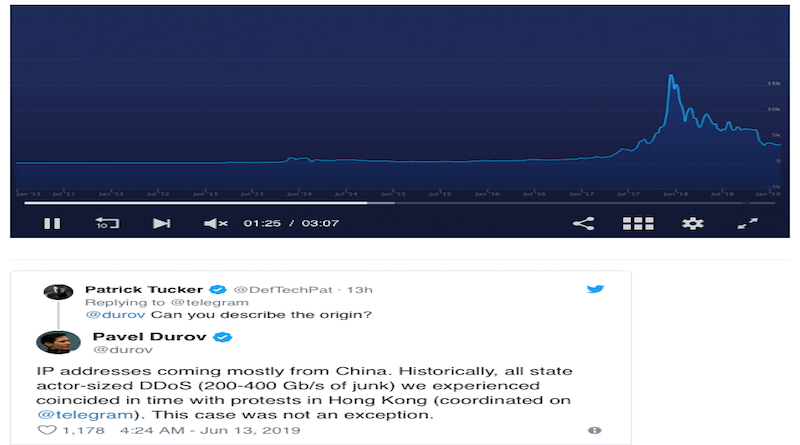China stretching its long arm to control mass protests against extradition law in Hong Kong

DHARAMSALA, 13 June: China has reportedly stretched its long arm by to disrupt the mass protests in Hong Kong against the controversial extradition bill with a massive hacking attack on the Telegram Messenger, an app being used by the demonstrators to organise the protests.
While the messaging app was widely used by Hongkongers to organize themselves, alert each other about activities on the ground, as well as information on where to find resources like gas masks and drinking water, yesterday, the service went down after it was affected by a ‘powerful’ DDoS attack for roughly an hour, according to a report on thenextweb.com, a website that focuses on international technology news.
Pavel Durov, the founder of Telegram has said earlier today that China was behind the massive hacking attack on the encrypted-messaging app being used by Hong Kong demonstrators to organise protests against the territory’s planned extradition bill as IP addresses of those flooding the servers with traffic to disrupt service — a so-called distributed denial-of-service — came mostly from China.
Meanwhile, Hong Kong’s pro-democracy lawmaker Claudia Mo has accused Hong Kong Chief Executive Carrie Lam of carrying out the wishes of Beijing.
“Carrie Lam has proved just a little puppet of her Beijing boss, and she would just do anything the Beijing boss tells her to do,” Bloomberg quoted her as saying in its report.
The Chief Executive of Hong Kong announced the proposal to amend the city’s extradition laws earlier this year in February so that it would allow criminal suspects from any region—including mainland China—to seek extradition without Hong Kong’s unicameral legislature, the Legislative Council, signing off on the requests.
The city’s head of government, the chief executive, would be able to approve the extradition requests directly if the bill is passed.
The controversial bill was the subject of the largest demonstration the city has witnessed since it was handed back to China in 1997 by the British.
The first protest against the bill was organised by Civil Human Rights Front (CHRF) on 31 March and more than 1 million protesters took to the streets of Hong Kong on Sunday demanding Lam’s resignation and the bill be scrapped.
The bill met with widespread opposition from the Hongkongers, international rights groups and as well as the city’s traditionally conservative business community as they raised concern over Beijing’s poor human rights record and opaque legal system while the last British governor of Hong Kong sees it as “an assault on Hong Kong’s values, stability and security.”






